We’ve all been there. Whether it’s a golden retriever, a German shepherd, or a Chihuahua, most of us have had the desire to have a canine member of the family. We’re not going to lie: it’s a great feeling knowing your dog is there for you when you’re home alone.
But as we all know, there are a lot of responsibilities that come along with having a pet. Also, your decision-making skills will be tested, especially when choosing the breed of dog. If you are still confused about which dog breed to have, well, we got some suggestions for you. How about a Newfoundland dog?
What’s a Newfoundland Dog?
The Newfoundland Dog is a large, strong, and powerful dog. They are strong, well-balanced dogs that make wonderful family pets. This breed is a very loyal dog and is very friendly. This breed is best suited as a farm dog.
They are also well-suited for working, hunting, tracking, and guarding. All of which makes them ideal for Americans, but not so much for us in Newfoundland, where it’s very cold in the winter.
Newfoundland Dog is a breed of dog that originated on the island of Newfoundland in Canada. No one knows where the Newfoundland Dog came from, but it is known that the breed originated from dogs brought from the island of Newfoundland to England in the early 1800s.
The breed developed from the inter-breeding of European dogs brought to Newfoundland in the 15th and 16th centuries by explorers. The dogs were bred with the local dogs, and gradually the type of dog that we know today was developed.
What was the purpose of creating this dog breed? Newfoundland dogs are known as working dogs even today. They were originally bred to help fishermen haul heavy loads and were great swimmers. Newfoundlands are also known for their loyalty, size, and intelligence.
What does Newfoundland look like?

Newfoundland Dogs are large, dark, and heavy dogs with a short, wide muzzle, broad chest, and strong, stocky build. Newfoundland dogs, also called Newfies, are usually black, and there’s no one rule for coat color.
They can be brown, gray, or white. They have a thick double coat of coarse hair and a short, dense undercoat. Their short, thick, and coarse outer coat is shed heavily twice a year. Their double coat is water-resistant and makes them excellent swimmers.
Newfoundland Dogs have a large head with a moderately pointed muzzle, and they have large, round, dark eyes with a mild expression.
They also have a prominent dewlap, a characteristic that shows the more powerful neck muscles of the dog. A Newfoundland Dog’s ears are erect with a slight stop, and its tail is thick and muscular.
There are few breeds more closely associated with the Canadian province of Newfoundland than Newfoundland. The breed is best known for its large size and gentle nature but is also well-known for its distinct facial markings, including a black nose and black lips. These markings differentiate Newfoundland dogs from other breeds found in Canada.
Newfoundland Temperament
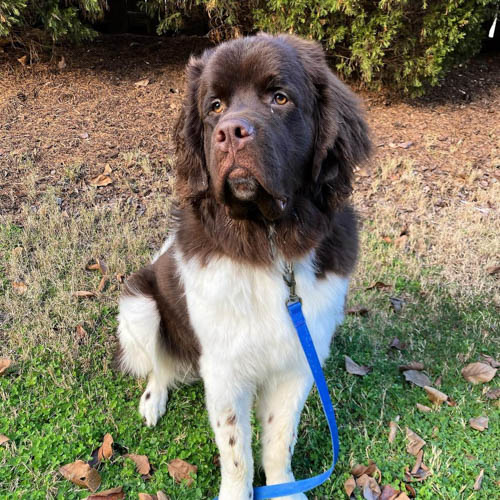
While there are many different breeds, Newfoundland is a well-known breed for its friendly, outgoing, and gentle temperament. It’s well-known for its excellent swimming ability and white belly. It loves playing ball, loves to be hugged and cuddled, and loves adventures.
They are kind, gentle giants that are easy to train and make great companions. They are very good with children and are natural watchdogs. They are loyal and protective of their family. They are not aggressive, and they are safer around other animals. They are incredibly intelligent and crave human interaction, but they have an independent streak.
Are Newfoundland good family dogs?
If you are looking for a breed that can be a lap dog or a large dog, you should look for Newfoundland Dogs. They are loyal, affectionate, and fun-loving dogs. Aside from being intelligent and kind dogs, they are very sensible too. They are a very gentle and affectionate breed of dog, and they tend to get along well with other pets.
They are usually very good with children, but they need to be trained early and may not get along especially well with other pets. They are very aware of their size and will not bully smaller dogs for their food. These dogs are very gentle and affectionate and can become quite attached to their owners. Also, this is the breed that is easy to train and housebreak.
How big do Newfoundland get?
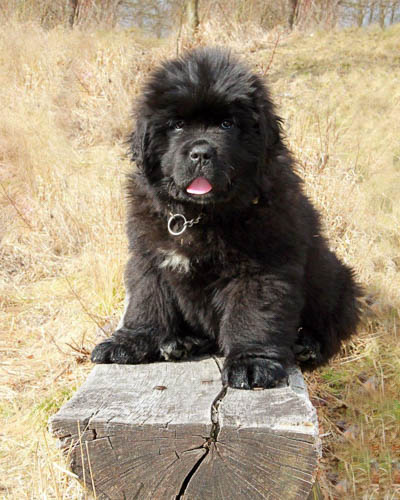
Newfoundland dogs are massive, and they certainly do not look like the small, cutesy dogs you see on TV. The Newfoundland is a giant dog, especially the male dog, standing 28 inches tall while the female Newfoundland dogs are just slightly smaller with a height of 26 inches.
These dogs are pack dogs and are known to be very protective of their family and their territory. They also have a “gentle giant” reputation and are great for families with children, as their playfulness is a good way to get kids to try different foods and get them used to interact with different people.
How much does Newfoundland weigh?
Newfoundland dogs are the biggest dog breeds and have a very heavy and robust appearance. For the males, their weight ranges from 130 to 150 pounds. For females, they can weigh between 100 to 120 pounds.
If you’ve never met a Newfoundland before, you would never know that Newfoundland dogs come in a wide range of sizes, shapes, and colors. Some Newfoundlands are smaller, others are bigger, and some are even really, really big. All this variation makes Newfoundlands the most diverse dog breed on the planet.
Newfoundland dogs—aka “Newfs”—are often referred to as the world’s strongest dog (and the most affectionate, too). But are they the strongest? Well, even though some Newfs can weigh more than 100 pounds, and some can grow as long as 6 feet, this dog is incredibly strong.
A strong dog can even drag a drowning person back to safety in a turbulent sea. Imagine that strength given its size and weight. Isn’t that amazing?
Does Newfoundland shed?

Newfoundland shedding is a common problem that all Newfoundland breeders must deal with regularly. That’s because it’s common to have shed in these dogs when they are young, as they have a double coat, one of which sheds and the other of which stays.
In addition, they require a lot of grooming and can be prone to skin issues. They shed like all dogs, but they are easy to groom since their thick, wiry coats are very dense. This coat is extremely hygienic, and Newfoundland dogs should be bathed to prevent mats and tangles.
Also, the hair should be brushed out regularly to keep the coat clean and free of dirt. Frequent brushing should also be a good preventative measure.
How often should you bathe a Newfoundland?
To help them keep cool and healthy, they love to get wet. Newfoundlands can swim, but they also love to be in the bathtub. Yes, they’ll even go in the shower. They love the water so much that they’ll pay you back by taking the hose and drenching you. So, how often should they get a bath?
You should bathe your Newfoundland every two weeks or once a month during the summer months. This breed is double-coated, so it needs to be bathed every 3 to 4 weeks. In addition, the fur is much more prone to matting in the summer, so you must brush your dog regularly.
Does Newfoundland bark a lot?
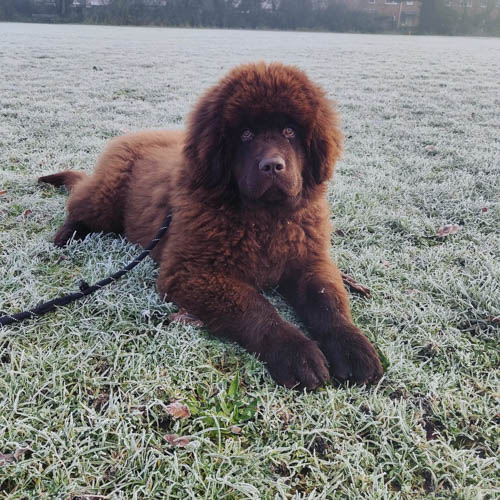
Most Newfie owners say that their dog is generally a quiet, docile, and friendly dog—that is until he is housetrained. Many Newfoundland owners say that their Newfs are a little too ‘talkative’ when they are young and tend to bark a lot as they grow into adulthood.
Newfoundlands are extremely loyal dogs, and they are somewhat protective of their family. Newfies have a very deep bark with a very distinctive sound. If they consider that they aren’t getting the attention they deserve, they will let out a loud bark hoping that someone will come to the rescue.
Are Newfoundlands hypoallergenic?
Newfoundlands are a lovely breed of dog that is gentle and affectionate. They are well known for their cheerful personalities and friendly attitudes. As a result, they make excellent family dogs. However, it’s important to note that Newfoundlands are not hypoallergenic dogs.
They have a double coat that can easily become matted and cause skin allergies. This can make these dogs difficult to tolerate in many homes, especially if they are not bathed frequently enough or kept in the same environment for a prolonged period.
Are Newfoundlands easy to train?
The Newfoundland Dog is relatively easy to train, although they may tend to assume the same position repeatedly. Many dog owners believe that this breed is easy to train, gentle and personable, and gentle with children. However, the truth is that breed is quite an active dog, which requires plenty of exercises and physical activity.
Newfoundland dogs are among the most physically and mentally demanding breeds globally, requiring a lot of stimulation and mental stimulation.
When it comes to types of exercise, a good hike or long walk is always a good way to start since they are natural runners. If you want to go even further, a dog sledding or agility course would be a fun and active way to spend time with your dog.
Do Newfoundland dogs have behavior problems?
Newfoundland dogs tend to be very obedient and pleasant, but they can sometimes be shy and nervous around strangers. Newfoundlands are very well known for their gentle, sweet, and child-like nature, but they have some behavioral problems.
Here are some of the common behavioral problems that can be seen among Newfoundland dogs:
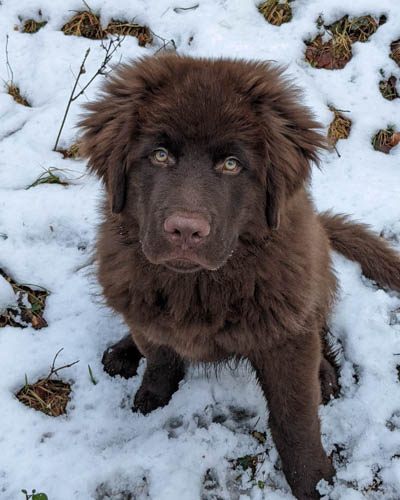
- Barking:- Newfoundlands are well known for their big ears and funny bark, but perhaps less well known is that they are also known for their tendency to bark excessively. This behavior can present challenges to breed owners and can also be a reason for pet owners to surrender their pets to a shelter. Well, it’s not a secret that a dog can be noisy, and Newfoundland Dog is no exception. Let’s face it, when a dog barks, it’s usually because something is going on in the neighborhood, and no dog likes to be ignored. It’s a social thing, and it’s also an indicator that your dog needs to go outside to relieve itself.
- Separation anxiety:- Depending on your personal experience with dogs, separation anxiety can be one of the most troublesome behavior issues seen with these dogs. If you are constantly worrying about your dog, or if you have to force your dog to be separated from you, then you should consider the possibility that your dog shows signs of separation anxiety. Separation anxiety is a common behavioral issue seen in many dogs. The reasons for this can be numerous and can be rooted in many things. This issue can be especially common in some breeds and is difficult to truly understand. This article will look at separation anxiety and its causes in the Newfoundland Dog and what can help.
- Mouthing:- Mouthing is a behavior issue seen with the Newfoundland dog. Mouthing is defined as the dog sticking his or her mouth on other people or other dogs. Sticking a dog’s mouth on someone or another dog is not alright. It is a serious behavior issue to the owner, the family, and the dog.
- Counter surfing:- Counter surfing is one of the behavior issues seen with the Newfoundland dog. This is when an individual begins to eat food placed on the counter or table. While this behavior is normal for dogs and owners alike, people who live with children and the elderly may want to be cautious.
- Predatory drive:- Any dog lover will be familiar with predatory drive, a behavior problem seen in some dog breeds that sees them chasing and attacking small animals. This is not a trait exclusive to Newfoundland, but the breed is certainly more prone to this type of problem than other dogs.
- Digging:- Digging is not only a destructive habit but one that can do damage to your home, as well as your Labrador’s health. Drawing attention to this behavior, we will help you understand how to stop your dog from digging the right way.
- Selective hearing:- Selective hearing is an issue that can be seen in dogs of all breeds. While it is not a common problem, it can be observed in purebred dogs and mixed breed dogs. The trick is to understand selective hearing, as there are many misconceptions regarding this condition.
- Jumping:- Jumping on other dogs is a difficult issue in many breeds, and the Newfoundland dog is no exception. Newfies are notorious for jumping on other dogs, but this behavior is also a result of other problems in the dog’s life. To learn more about this behavior, we will talk about how to deal with Newfoundland dogs jumping on other dogs and other issues that can cause the problem.
- Pulling:- Pulling is a behavior issue that’s often seen in the Newfoundland Dog. It’s usually an issue that starts in puppyhood but can happen from any age. It’s not a serious problem, but it can lead to other behavioral issues if you don’t correct them early on.
- Resource guarding:- Resource guarding is one of the most common issues people see with their Newfoundland dog. It can be a serious problem, and many owners won’t realize that it affects their dog until it starts to get worse, or worse yet, suddenly gets worse. It is a serious problem, and it needs to be addressed immediately.
Dog ownership is a great joy, but it’s also challenging. With their level of intelligence, loyalty, and ability to bond with people, Newfoundland dogs are a breed of dog that many people are drawn to as they know they can’t go wrong.
But Newfoundland dogs are not all that they seem. It’s a breed that is jealous of its owner, may push its owner to the edge, and can get quite aggressive. So, it is better to train your dog early to avoid problems in the future.
How much does Newfoundland cost?
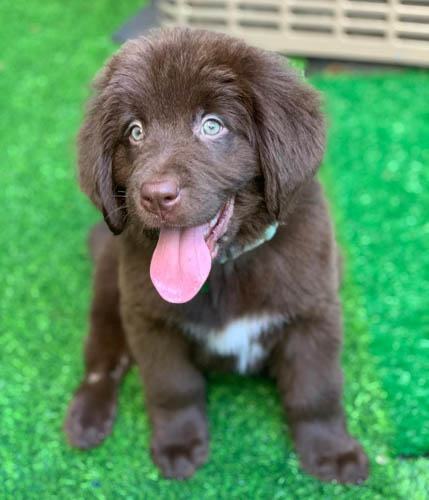
Let’s get this out of the way first: Newfoundland dogs are expensive. If you know anything about buying a purebred dog, you know this—and you may have even heard the Newfoundland’s reputation as a difficult breed to find.
While Newfoundland puppies can be a bit more expensive than most other purebred dogs, this does not mean that you should avoid the breed entirely—especially if you’re looking for a family dog.
Where to buy/adopt Newfoundland Dog?
While some would suggest buying one from pet stores, it would be better to adopt one. With that said, there are Newfoundland rescues that specialize in taking care of Newfoundlands and will even find the pets forever homes with the right family. You can start researching online on rescue centers near you to know if a Newfoundland dog is looking for a forever home.
